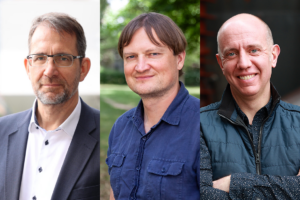For the second consecutive year, three professors at University of Luxembourg, Michael Heneka, Alexandre Tkatchenko and Paul Wilmes, have been selected on the Highly Cited Researchers 2024 list by Clarivate. A distinction that places them in the top 1% of researchers worldwide, as their highly cited papers rank in the top 1% by citations for their fields and publication year.
Citations as a measure of impact
Citations are a key indicator of a researcher’s influence, as they reflect how often their work is referenced by their peers. When a paper is frequently cited, it means other scientists have found its insights crucial to supporting new hypotheses, building on its results, or applying its techniques in novel ways. As high citation rates are not merely a count of popularity but also signify that the research has made foundational contributions, they can serve as an objective measure of a researcher’s impact on the scientific community, and their contribution to extending the frontiers of knowledge.
Neuroinflammation and microbiome research in the spotlight, using computational and AI models to study complex materials
LCSB Director and board-certified neurologist Prof. Michael Heneka has dedicated his career to understanding the complexities of neurodegenerative diseases, particularly Alzheimer’s. His work has shed light on the immune system’s role in Alzheimer’s, revealing how immune dysregulation and neuroinflammation contribute to disease progression. Using state-of-the-art techniques such as two-photon imaging and advanced preclinical models, Heneka and his team aim to advance the understanding of cellular and molecular interactions in Alzheimer’s disease that could serve as biomarkers or novel targets for the therapeutic interventions.
Systems Ecologist Prof. Paul Wilmes investigates the microbiome in health and disease. A particular focus of his research, also funded through a prestigiuous ERC Consolidator grant, is the gut-brain axis and how gut microbes impact neurodegenerative diseases such as Parkinson’s. His research group’s development of HuMiX, a microfluidic gut-on-a-chip model, allows in-depth study of human-microbe interactions and reveals how microbial molecules affect the gut, immune or neuronal cells of the human host.
Prof. Alexandre Tkatchenko is a Professor of Theoretical Chemical Physics and Head of the Department of Physics and Materials Science at the Faculty of Science, Technology and Medicine (FSTM). The Theoretical Chemical Physics group, composed of multidisciplinary scientists, develops novel methodologies and undertakes ambitious computational projects to address fundamental and challenging aspects of systems at the intersection of physics, chemistry, and biology. The key goal of this work is to bring quantum-mechanical level of accuracy and insight to large and complex systems. His research has been generously funded by the ERC (Starting, Consolidator, Advanced, 2 Proof of Concept), FNR, and through many industrial collaborations. He is also a co-founder of Quastify GmbH – a start-up that combines quantum and statistical mechanics with machine learning for efficiently exploring chemical spaces.
The University congratulates three exceptional scientists who contribute everyday to innovations with a societal impact.
